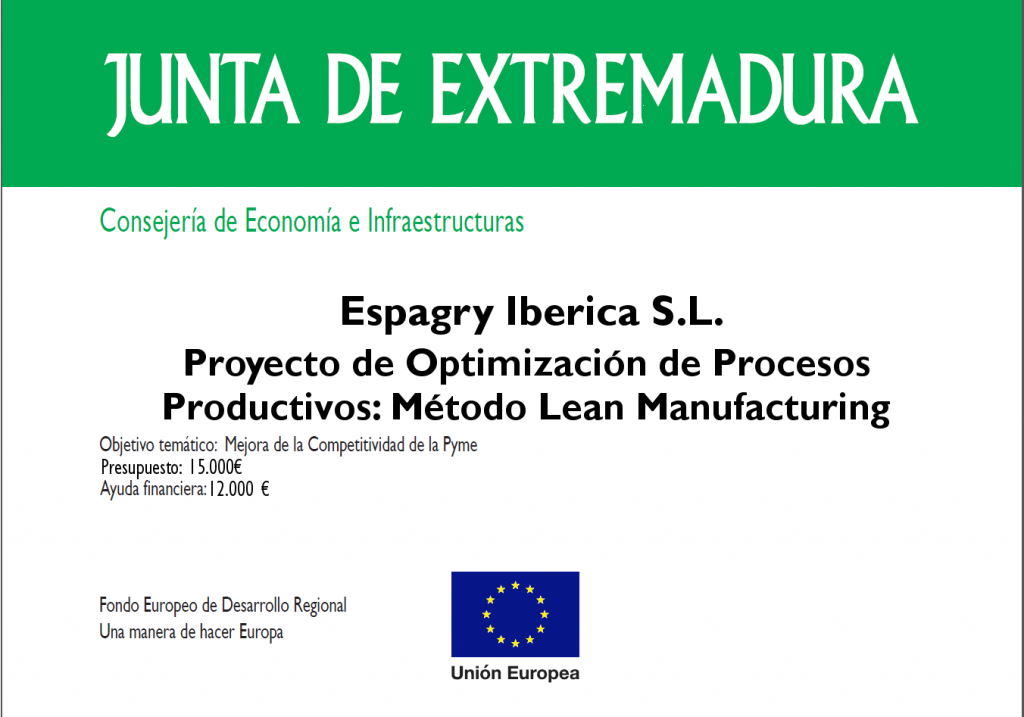
Lean Manufacturing
In Espagry Ibérica we have opted to carry out a Productive Processes Optimization Project, seeking to be more efficient in our production system. And we have been able to do this thanks to the grant from the ERDF Funds.
The methodology to be used in the development of the project is “Lean Manufacturing”. This procedure, innovative from the point of view in which processes are improved, is currently being introduced in Spain.
The use of this system, based on reducing activities that do not add value to the product, instead of the traditional vision of improving those that add value, make important progress in a short time.
This is due to the fact that the activities that do not add value to the processes, the so-called waste, usually represent between 80% and 95% of the total activities. So, based on this figure, you can see the potential of this optimization technique.
The waste that this methodology focuses on are simple:
– Overproduction
Produce goods that the customer did not order:
- Produce more than what is needed in the next process.
- Produce before the next process needs it.
- Produce faster than the next process needs
– Inventory
Materials in any step of the process, not necessary for production.
– Overprocess
Running processes not necessary to meet the needs of our customers.
Because we want to differentiate ourselves from our competitors.
– Rework
Repair products that are good.
– Transportation
Move products from one process to another or to the warehouse of finished products.
– Movement
People walking without producing.
– Wait
People who do not work while something must happen or arrive.
– Do not use the capabilities of people
Do not ask the workers in the position how to improve, when they are the ones who spend the most time in it, and know it better than anyone else.
Methodology and areas of action
It is therefore pursued that, the company in which the Lean Manufacturing methodology is implemented, has an open attitude to the changes, which are governed by the rules of the Kaizen Spirit:
- Leave fixed ideas, refuse the current state of affairs.
- Instead of explaining what can not be done, reflect on how to do it.
- Make good ideas for improvement right away.
- Do not look for perfection, earn 60% from now.
- Correct errors immediately, in situ.
- Find ideas in difficulty.
- Find the real cause, respect the 5 why? And then look for the solution.
- Take into account the ideas of 10 people instead of the great idea of a single.
- Test and then validate.
- The improvement is infinite.
The way to apply this system efficiently, is to use a sustainable method over time, so that the company itself can manage its continuous improvement system autonomously.
The three areas of action will be the following:
- Human Production Organization.
- Production system efficiency.
- Improvement of the production flow.
Objetives
The objectives that are pursued are the following:
- Improvement of control over production.
- Improvement of compliance with customers.
- Reduction of stops.
- Improvement of the customer link by Expeditions.
- Reduction of operating costs.
Expected results
After the accurate implementation of the Lean Manufacturing Methodology for the Optimization of Productive Systems in the company, the following results are foreseen:
- Improvement of coordination between posts.
- Increase in equipment availability.
- Staff more trained and prepared in the processes.
- Increase in production possible.
- Reduction of change times.


